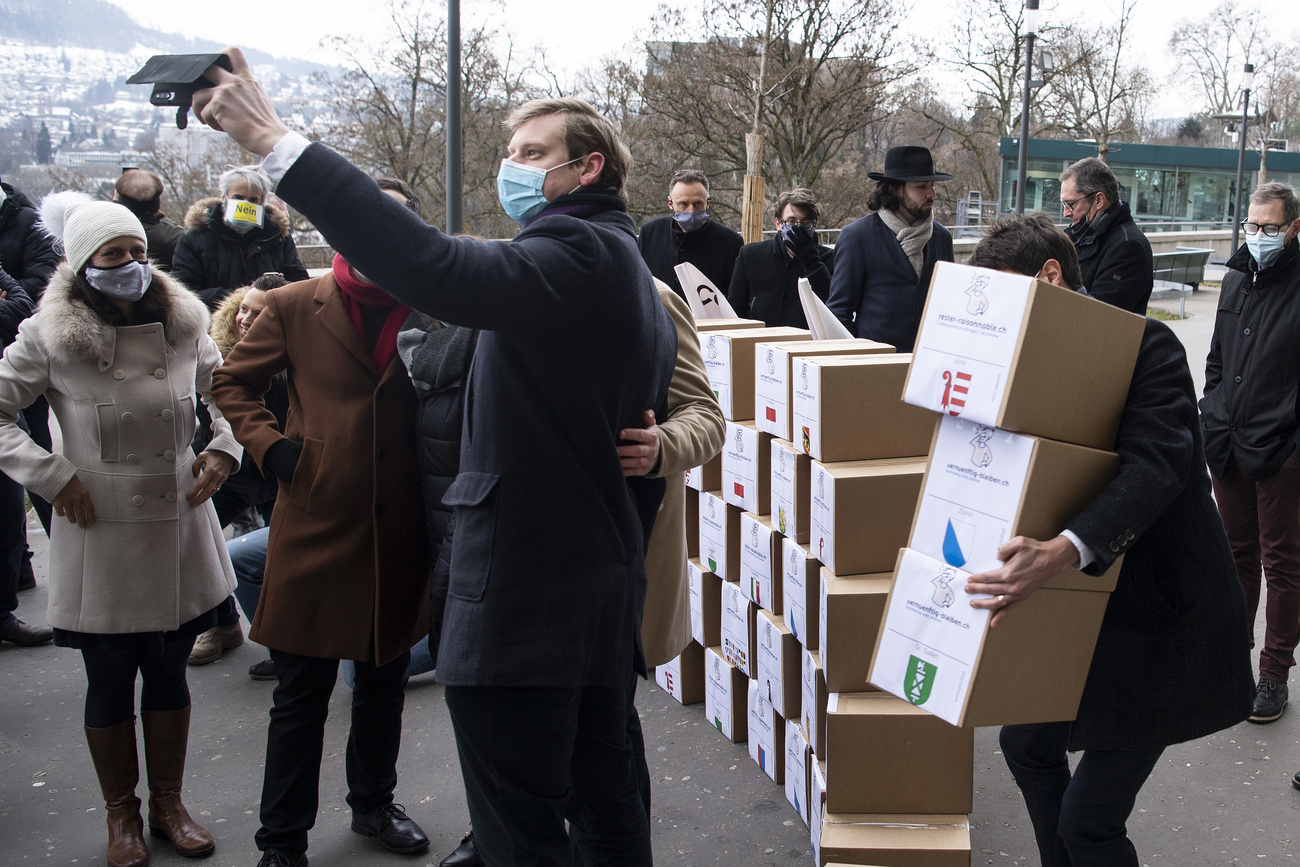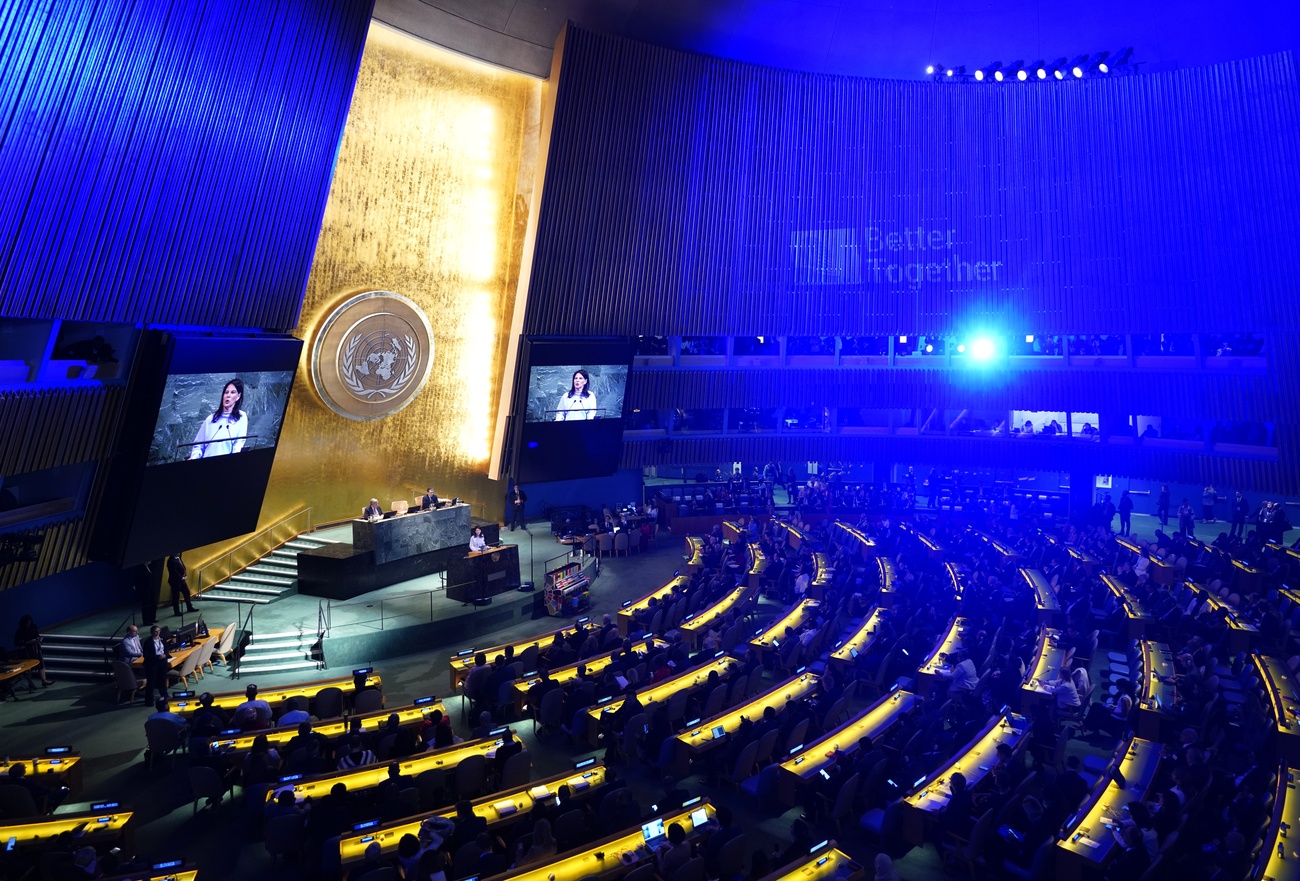
Referendums still thriving amid Covid measures

In this week’s democracy briefing: as the Swiss government announces new Covid measures, campaigners have been collecting more signatures than ever to challenge them. Also, citizen assemblies take off in Germany and France, and the dust settles(?) after the Capitol riots and ahead of the inauguration of the new US administration.
Appetite for engagement
When Covid-19 hit last year, many worried the emergency measures could mean a threat to democratic freedoms. Not only might autocrats use the confusion to boost their power, but traditional democracies could all too easily neglect the liberties they have taken for granted for decades, went the argument.
In Switzerland, with its system of modern direct democracy, these fears had a particular flavour. Beyond the danger of arbitrary government action (a fear still sparking protests), the worry was that new rules would make life impossible for citizen campaigners, who rely on human contact and rallies to launch initiatives and referendums.
This week, it became clear that those fears were – if not unfounded – at least exaggerated: no less than three groups handed in signatures to challenge recently passed laws. And not only did they hand in enough signatures: in most cases they managed to secure well over the 50,000 names required, thanks to public interest which “astonished” campaigners themselves.
Were they helped by the new, supportive rules which authorities introduced in October to ease the burden on signature collecting? Campaigners have continued to say that their work is “complicated” by Covid. But clearly the appetite among citizens, activists, and parties to keep an eye on power hasn’t been dampened.
- Two of the referendums target high-profile laws passed by parliament last September: a CO2 bill to combat climate change, and the so-called “Covid law” which underpins government action in the pandemic (SWI swissinfo.ch)
- The third challenge is to a controversial anti-terrorism bill which gives police wider powers to clamp down on suspects. UN experts, including special rapporteur Fionnuala Ní Aoláin, also have concerns about the legislation (Republik.ch)
- How is Covid-19 impacting how campaigners go about things in Switzerland? And how important is the referendum function for keeping a check on executive and parliamentary power? (SWI swissinfo.ch)

Hitting the big time
Citizen assemblies – randomly selected groups of “normal” people who meet to discuss policy – continue to be a global trend. Over the past decade assemblies have been used in various forms and places, including for constitution-building in Iceland, informing voters in Switzerland, and advising on climate policy in France.
Recently three more projects were launched. The first, in France, is an ambitious attempt to bring the voice of citizens into the country’s Covid-19 vaccination plans, which French people are notoriously sceptical about. The 35-member body, announced by Emmanuel Macron just after the new year, is set to meet for the first time this week.
Another project also started this week in Germany: in 10 online events running until February 20, 160 citizens will come up with recommendations for “how the Federal Republic should act on the global political stage in the future”. It’s the second such assemblyExternal link to be run in Germany, after last year’s project for “strengthening German democracy”. Their advice will be presented to parliament in Berlin on March 19.
And in Switzerland, in the southern canton of Valais, citizens are being consulted on a more general scale: after voting in 2018 for an overhaul of the regional constitution, residents (including foreigners) now have two months to give anonymous feedback on a first draft of the new document. The constitutional committee drawn up to write the charter is itself made up of a group of 130 citizens.
- The background to the project in Valais, one of the last cantons in Switzerland to update its constitution, which dates back over a century (SWI swissinfo.ch)
- Hélène Landemore, a leading scholar on citizen assemblies and “Open Democracy”, outlines the advantages of the concept (SWI swissinfo.ch)
- One of France’s major daily newspapers is not particularly enamoured of Macron’s citizen assembly plan, which it calls “the wrong good idea”External link; such experiments can “wait until after the emergency”, it says (Le Monde, in French)

Protest-ant ethic
What’s to be said after the storming of the US Capitol in Washington last week? What does it mean for the world’s democratic beacon? What does it mean for democracy in the world generally? Was it the last spurt of a four-year flurry of madness? Or a first case of simmering violence spilling from online into reality? Are we all doomed?
Lots of people, in lots of places, have tried to give lots of answers to such questions over the past week or so. In Switzerland, newspapers (see below) and social media alike were a bit stupefied. Elsewhere (see below) some have also warned against the complacent attitude that such actions could never spread across the Atlantic.
- “Images of shame”; “Trump should be led out in handcuffs”; a “scandal”, but more a reflection of Trump than a reflection of the US – this was the reaction of the Swiss press to the Capitol fiasco (SWI swissinfo.ch)
- Is violence an essential element of the development of democracy in the first place? Where is the line? A piece (in German) from our archives about the link between protest and democracy (SWI swissinfo.ch)
- One for the reading list: Gideon Rachman reckons “Europe is not immune from America’s political madnessExternal link”. (Financial Times)

Is there anything else you’d like to hear about from the world of democracy? Get in touch with our correspondents Domhnall O’Sullivan or Bruno Kaufmann

In compliance with the JTI standards
More: SWI swissinfo.ch certified by the Journalism Trust Initiative




























You can find an overview of ongoing debates with our journalists here . Please join us!
If you want to start a conversation about a topic raised in this article or want to report factual errors, email us at english@swissinfo.ch.